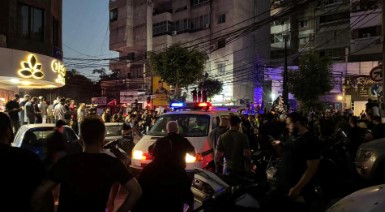An Israeli airstrike targeted a senior Hezbollah commander in the southern suburbs of Beirut, marking a significant escalation in the ongoing conflict between Israel and Hezbollah. The strike, which occurred around 7:40 pm local time (1640 GMT), was in retaliation for a cross-border rocket attack on the Israeli-occupied Golan Heights that killed 12 children and teenagers three days prior.
A witness reported a loud explosion and a visible plume of smoke rising from the area, which is a stronghold of Hezbollah, the Iran-backed Lebanese militant group. A senior Lebanese security official confirmed that the airstrike was aimed at a senior Hezbollah figure, though details about the commander’s condition remain uncertain.
According to Lebanon’s State-run news agency, the strike targeted the vicinity of Hezbollah’s Shura Council in the Haret Hreik neighbourhood. Tensions in Beirut have been high following the deadly rocket attack on Saturday, which struck a football field in a Druze village and led to the deaths of 12 young people.
Hezbollah has denied any involvement in the rocket attack. In response, the Israeli military stated that the airstrike was a targeted operation against the commander responsible for the attack and other attacks on Israeli civilians. Further details were promised to be released later.
Earlier on Tuesday, rocket fire from southern Lebanon resulted in the death of a civilian in a kibbutz in northern Israel. The Israeli military reported that 15 rockets had been launched from Lebanon in recent hours, with impacts in parts of the Upper Galilee region. Fortunately, no injuries were reported from these strikes.
The Israeli air force also targeted a Hezbollah observation post and “terror infrastructure” in south Lebanon. These actions follow a pattern of ongoing skirmishes between the two sides, with the Israeli military claiming to have hit around 10 Hezbollah targets overnight and killing one Hezbollah fighter. Hezbollah confirmed the death of one of its members.
US Defense Secretary Lloyd Austin expressed concern over the potential for escalation but maintained that a broader conflict was not inevitable. Despite frequent exchanges of fire since the onset of the Gaza war in October, both Hezbollah and Israel have indicated they do not seek an extensive confrontation. However, the situation remains volatile, with ongoing diplomatic efforts to manage the crisis and prevent further escalation.

















